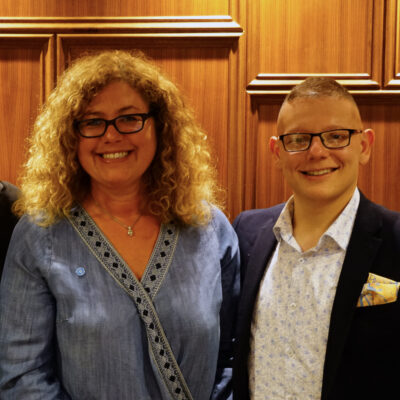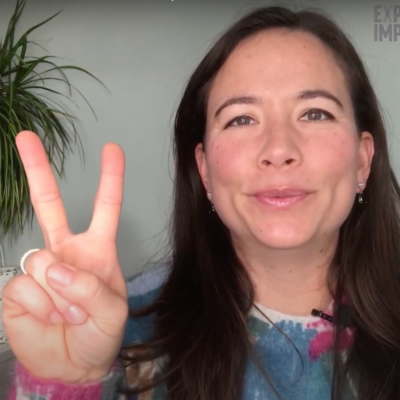When she was aged 23, Jane Hatton broke her back in a riding accident. Despite recovering after six weeks spent lying flat, she was left with chronic pain, something which three further surgeries failed to abate. Incredibly, when she started Evenbreak, a recruitment company serving disabled job seekers, in 2011, she did so whilst lying flat with a laptop suspended above her (pictured above).
“If I went to meetings, which was rare, I’d have a driver who drove me there lying flat. Then I’d stand at the meetings and be taken back home in the same way. So I was either lying in bed with a laptop above me or standing in meetings briefly,” said Jane.
Although more mobile these days, she continued working like this for six years. Jane had become aware of the barriers facing disabled people when she was working in the equality and diversity field. Disabled candidates she talked to were scornful about companies proudly proclaiming that they were equal opportunity employers and saw it as mere lip service.
“When I talked about disability, particularly to employers, they would either say, ‘why would I want to employ a disabled person?’ or more positively that it was something they wanted to do but didn’t really know how,” said Jane.
Initially Evenbreak was a simple jobs board for disabled candidates and employers “enlightened enough to see us as a pool of talent rather than as a problem,” as Jane describes them. Nowadays Evenbreak offers employers support on becoming more inclusive and accessible to disabled jobseekers and employees, alongside a career service for disabled candidates. Her clients are mostly large corporates, which account for 80% of the jobs posted with her.
While conceding that the advent of a new year can tip those putting up with a job they’re unhappy with into taking action, she also sees busy periods around the end of the financial year when budgets are being spent, and in the Autumn when newly qualified students enter the job market. But she thinks disabled candidates are consistently watchful for better opportunities.
“They’re kind of looking throughout the year anyway. Disabled people in work tend to be underemployed. And then there’s the disability pay gap,” said Jane. In 2020 the TUC found that disabled workers earn 20% less than those without disabilities.
This seems particularly unfair because disabled people, courtesy of their lived experience, possess skills highly desirable to employers. Jane views disabled people as premium candidates.
“We face barriers every day in a world that’s not designed for us and that means that we learn resilience and creative problem-solving skills and all the things that employers really need,” said Jane.
When the pandemic first started, Jane feared Evenbreak might not survive but there was a happy ending. As the mass experiment of people working from home proved successful, she became inundated with enquiries and business has since doubled.
“We’ve gone past the time when everybody has to work 9-5 full-time Monday to Friday in an office. There’s much more flexible ways of working now and actually disabled people are masters of this because we’ve done things differently all of our lives.
“The more disabled people recruiters employ, the more flexible their workforce is going to be, and the more resilient and adaptable to new ways of working,” said Jane.
Jane used Expert Impact for mentoring on engaging with corporates. If you’d like some support with your business from any of our mentors, start here


